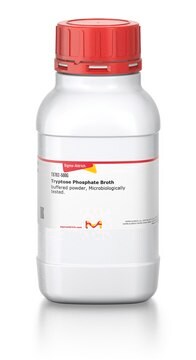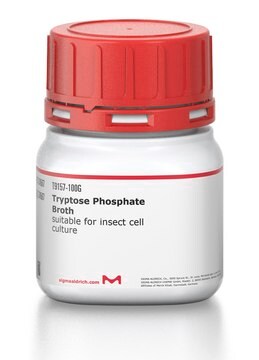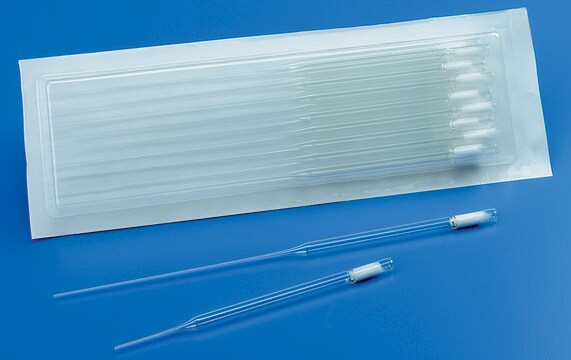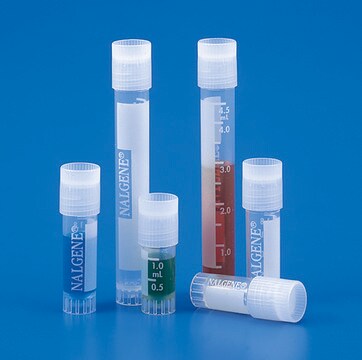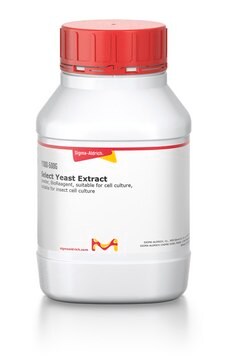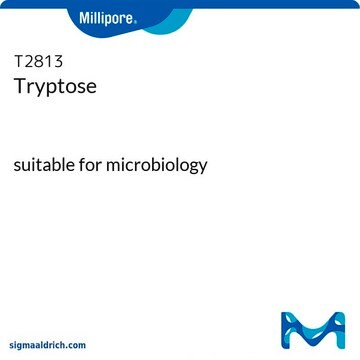T8159
Tryptose Phosphate Broth solution
sterile-filtered, suitable for cell culture
Sinônimo(s):
TPB solution
Faça loginpara ver os preços organizacionais e de contrato
About This Item
Código UNSPSC:
12352205
NACRES:
NA.75
Produtos recomendados
esterilidade
sterile-filtered
Formulário
solution
concentração
29.5 g/L in deionized water
técnica(s)
cell culture | mammalian: suitable
Condições de expedição
ambient
temperatura de armazenamento
room temp
Aplicação
In addition to its use for the growth of fastidious micro-organisms, Tryptose Phospate Broth (TPB) has been studied as supplement for the preparation of media that supports vaccine production in BHK-21 cells and the growth of SF21 insect cells in high-density perfusion culture stirred-tank bioreactors.
Componentes
Tryptose Phosphate Broth (TPB) is composed of four components: Tryptose (20g/L); Dextrose (2g/L); NaCl (5g/L) and Disodium Phosphate (2.5g/L) typically adjusted to pH 7.3. The tryptose component is a peptone (mixture of amino acids and short peptides) derived by the mixed enzymatic hydrolysis (pancreatic enzymes) of the milk protein casein. This hydrolysate provides a source of amino acid based nutrients and survival factors that support the growth of fastidious micro-organisms such as Brucella, Streptococcus, and Neisseria; as well as eukaryotic cells such as insect and animal cells. Dextrose provides a fermentable carbohydrate that can be used by fastidious mico-organisms. Sodium chloride maintains the osmotic and ionic equilibrium and disodium phosphate provides the basic buffering capacity.
Código de classe de armazenamento
10 - Combustible liquids
Classe de risco de água (WGK)
WGK 2
Ponto de fulgor (°F)
Not applicable
Ponto de fulgor (°C)
Not applicable
Escolha uma das versões mais recentes:
Já possui este produto?
Encontre a documentação dos produtos que você adquiriu recentemente na biblioteca de documentos.
Os clientes também visualizaram
Dong-Hwan Kim et al.
Molecular biotechnology, 63(2), 140-149 (2021-01-03)
Selection of guide RNA (gRNA) is important to increase the efficiency of gene editing in the CRISPR/Cas9 system. Due to the variation in actual efficiency of insertion/deletion (indel) mutation among selected gRNAs in silico, reliable methods for validation of efficiency
S N Saha et al.
Vaccine, 7(4), 357-363 (1989-08-01)
Studies were undertaken to develop a cheaper medium with indigenous sources of peptone and casein hydrolysate for continuous culture of BHK-21 (suspension) cells and production of foot-and-mouth disease (FMD) vaccine. Eleven batches of experimental media were prepared using different indigenous
A I Josemans et al.
Annals of the New York Academy of Sciences, 969, 141-146 (2002-10-17)
The in vitro culture of Cowdria ruminantium, the causative agent of heartwater in domestic ruminants, was first achieved in 1985. Culture media were usually supplemented with serum and tryptose phosphate broth, both undefined components, contributing to great variability. Recently, we
Faizal Z Asumda et al.
Differentiation; research in biological diversity, 101, 16-24 (2018-04-08)
A variety of approaches have been developed for the derivation of hepatocyte-like cells from pluripotent stem cells. Currently, most of these strategies employ step-wise differentiation approaches with recombinant growth-factors or small-molecule analogs to recapitulate developmental signaling pathways. Here, we tested
Mark Smyth et al.
Frontiers in immunology, 12, 638485-638485 (2021-07-02)
Cytotoxic T lymphocytes (CTLs) represent key immune effectors of the host response against chronic viruses, due to their cytotoxic response to virus-infected cells. In response to this selection pressure, viruses may accumulate escape mutations that evade CTL-mediated control. To study
Nossa equipe de cientistas tem experiência em todas as áreas de pesquisa, incluindo Life Sciences, ciência de materiais, síntese química, cromatografia, química analítica e muitas outras.
Entre em contato com a assistência técnica